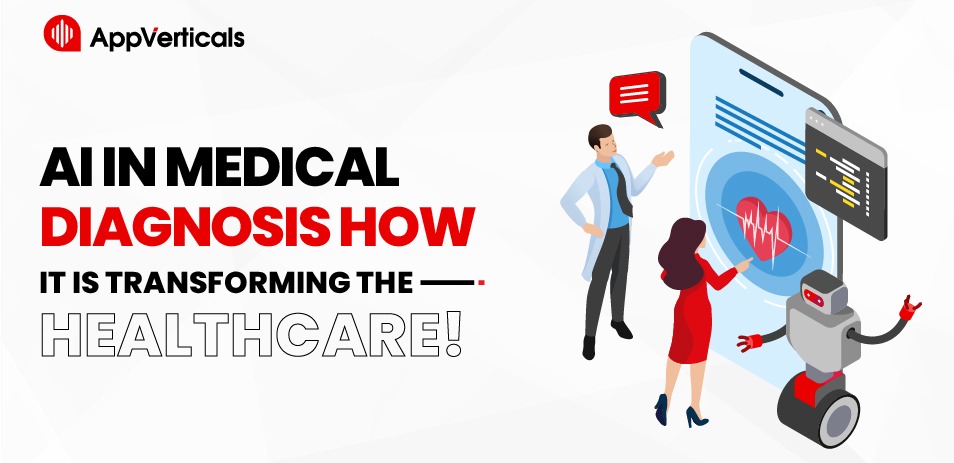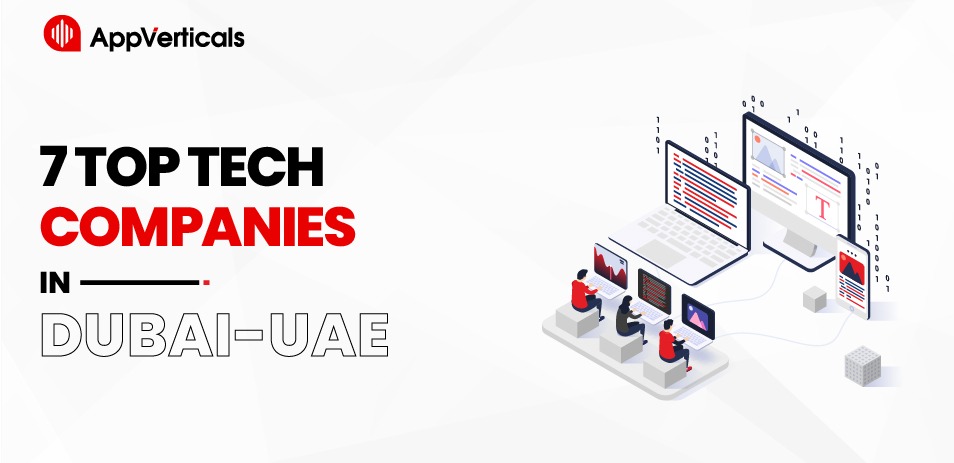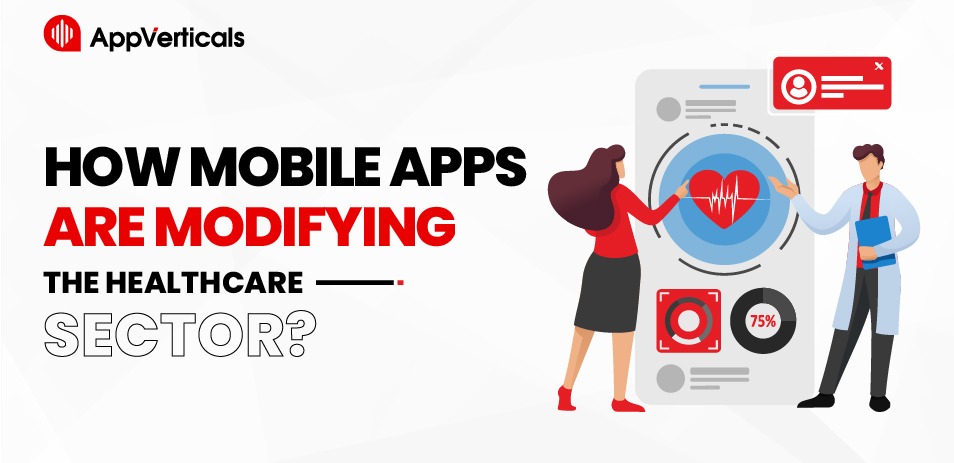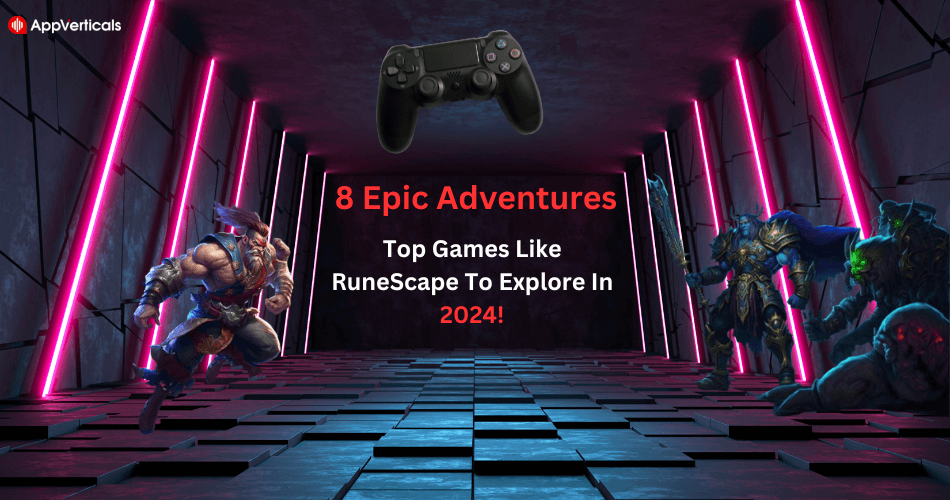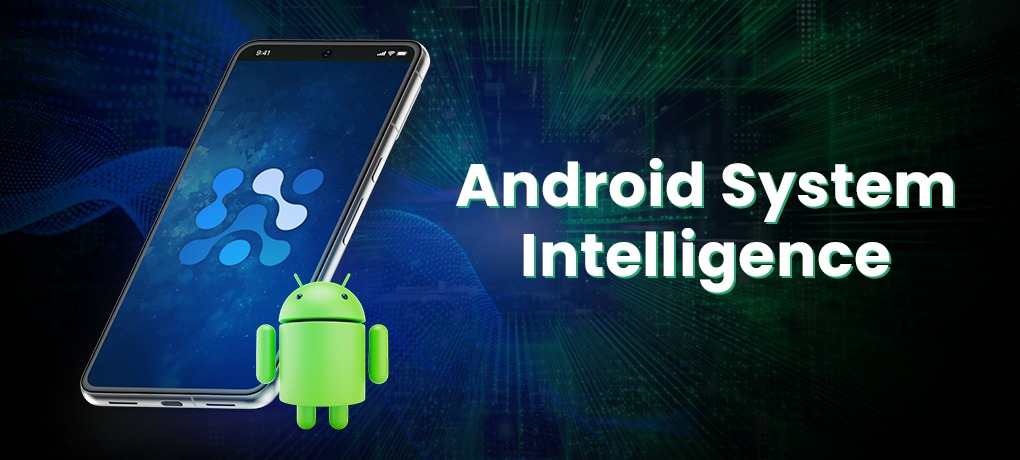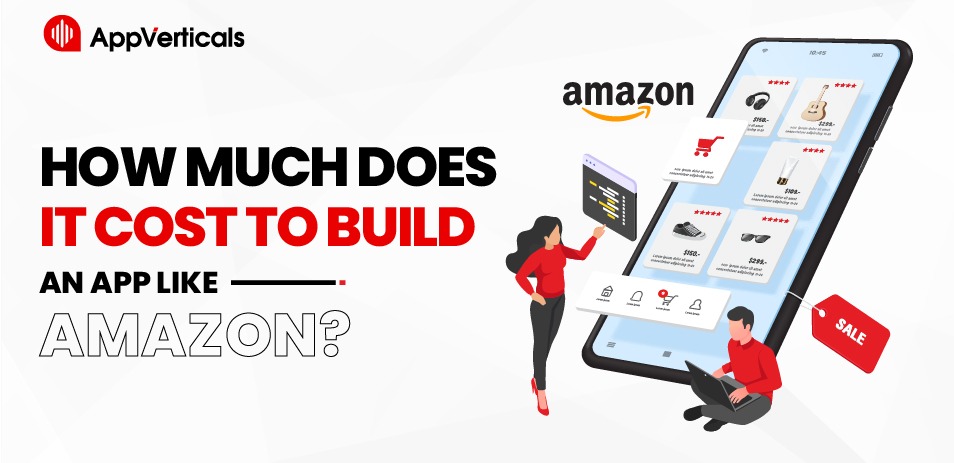Artificial Intelligence (AI) is changing healthcare, especially in diagnosing diseases. By using smart tools like machine learning, AI helps doctors give better care, make fewer mistakes, and improve health. Medical diagnosis software and apps, including Android apps, provide fast and reliable information to doctors and patients.
As more medical diagnostic apps are created, healthcare workers can find diseases earlier and provide treatments that fit each person. Hospitals and healthcare providers are also using AI to make free medical apps for patients.
This article will explain how AI-driven medical apps are transforming healthcare. We’ll use real-life examples, highlight key benefits, and look at how these apps may change healthcare in the future.
Role of AI in Medical Diagnosis
The Global Generative AI in Healthcare Market is expected to reach USD 17.2 billion by 2032.
AI tools can analyze large amounts of medical data, find patterns, and detect issues that human eyes may miss. This makes them especially useful for diagnosing complex or rare diseases, reducing mistakes, and improving patient care.
For example, AI-powered imaging tools can quickly analyze X-rays, MRIs, and CT scans to spot cancer, fractures, or other issues. These tools use deep learning to detect even tiny problems, making diagnoses faster and more accurate than traditional methods.
Medical diagnostic apps for patients and doctors are also becoming more popular. These apps can check symptoms, guide patients to the right care, and give doctors data to start treatment faster. Many medical diagnosis apps are available on Android, making these helpful tools accessible to millions.
On a larger scale, AI is helping predict disease outbreaks and find high-risk groups, improving public health responses. This makes healthcare systems more efficient and shows why AI in medical diagnosis is such a big step forward for modern medicine.
How Do AI-Powered Medical Apps Work?
AI-powered medical apps work by using algorithms and large amounts of data to analyze patient information, like symptoms, medical history, and test results. The apps use tools like machine learning (ML) and natural language processing (NLP) to spot patterns and make helpful suggestions.
When a patient enters their information, the app compares it with medical databases and guidelines. It can then suggest possible conditions, recommend further tests, or even propose treatments.
For example, AI-driven imaging apps can quickly look at X-rays or MRIs to find problems like tumors or fractures, helping doctors work faster and more accurately.
Some medical diagnosis apps for Android even include chatbots that help patients check their symptoms and decide if they need to see a doctor. Medical apps for doctors go a step further, giving them AI recommendations to help with decision-making during patient care.
These apps learn from new data, so they get more accurate over time. As more healthcare systems use these medical diagnostics applications, AI is making care faster, smarter, and more personalized. It also helps doctors save time on routine tasks, allowing them to focus more on patient care.
Top Benefits of AI in Medical Diagnosis
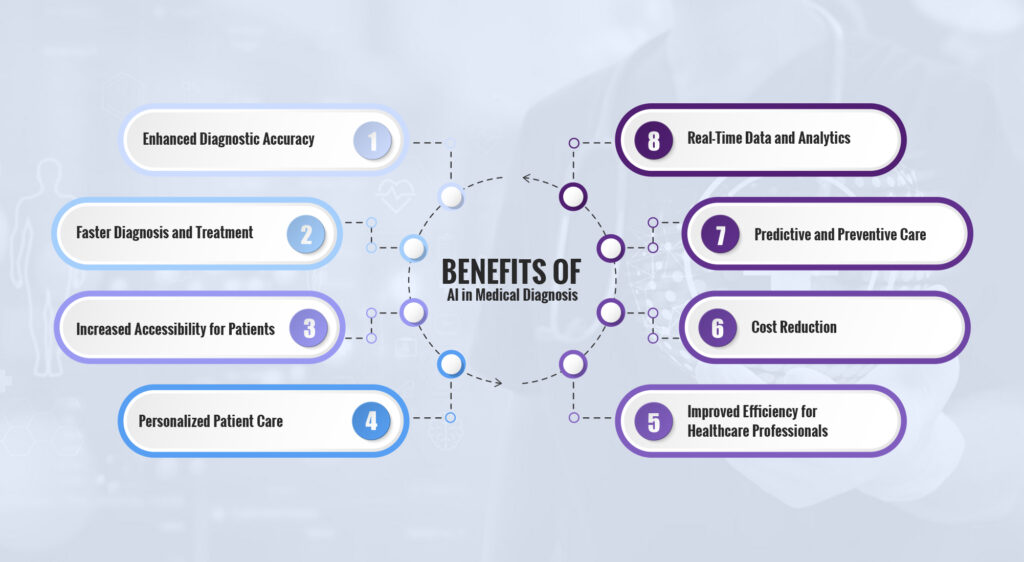
1. Better Accuracy in Diagnosis
AI helps doctors by analyzing large amounts of data, finding patterns, and spotting small details that might be missed. This makes diagnoses more accurate and leads to better patient outcomes. For example, AI can catch early signs of cancer, heart issues, and brain diseases, allowing doctors to start treatment sooner.
2. Faster Diagnosis and Treatment
In healthcare, speed is important. AI-powered medical diagnosis software can quickly process complex data and provide results quickly. This helps doctors start treatment more quickly, especially in emergencies where every second counts.
3. Easier Access for Patients
AI medical apps, available on Android and other platforms, make healthcare easier to access. These apps let patients check their symptoms or get a quick assessment for free or at a low cost. This helps people in remote or underserved areas get healthcare advice that they might not otherwise have access to.
4. Personalized Care for Each Patient
AI analyzes each patient’s data, including medical history and health conditions, to create personalized treatment plans. This ensures that care is specifically tailored to meet each person’s needs, making treatment more effective.
5. More Efficient for Healthcare Workers
AI takes care of repetitive tasks like analyzing data, reviewing images, and making initial diagnoses. This allows healthcare workers to focus more on important cases and direct patient care, making their jobs easier and reducing burnout.
6. Lower Costs for Healthcare
AI helps save money by reducing unnecessary tests and hospital stays. It also makes healthcare processes more efficient, which lowers costs. This makes healthcare more affordable and accessible for patients.
7. Preventive Care and Early Detection
AI helps doctors predict health problems before they happen. By analyzing data, AI can identify patients at risk for diseases and allow for early treatment. This helps move healthcare from simply reacting to illnesses to preventing them from happening in the first place.
8. Real-Time Data for Quick Decisions
Medical apps for doctors provide real-time data that helps them make fast, informed decisions. In emergencies, having quick access to the right information can be lifesaving, allowing doctors to act immediately.
“With its accuracy, speed, and ability to personalize care, AI is changing the way medical diagnosis works, benefiting both patients and healthcare providers.”
Provide AI-Powered Medical Diagnosis In Your Apps
We Help You Develop Innovative AI Solutions In Your Medical Diagnosis Apps.
Talk To Our Experts Now!Real-World Applications of AI in Medical Diagnosis
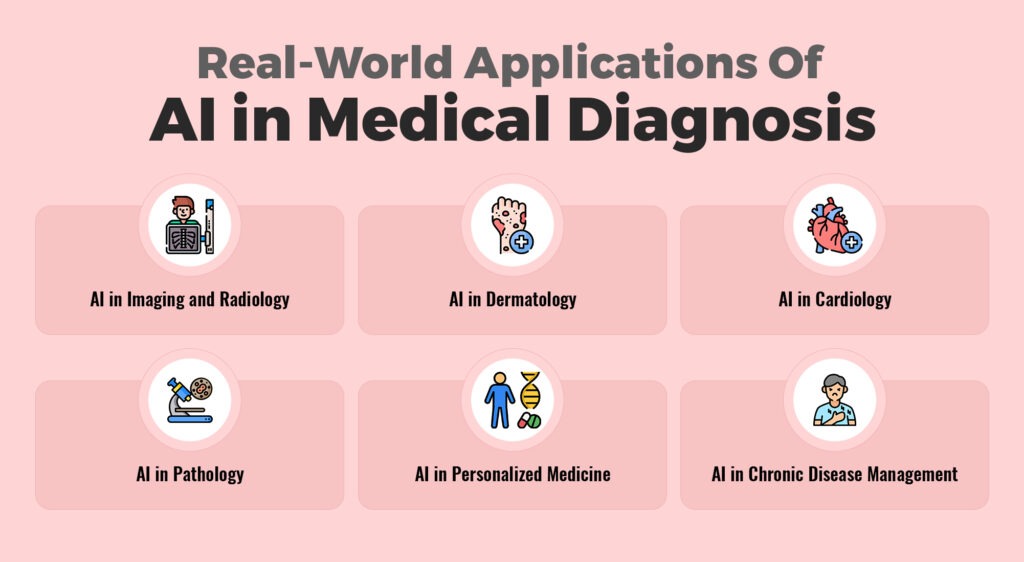
AI in Imaging and Radiology
AI is having a big impact on imaging and radiology. Doctors now use AI to help analyze images like X-rays, CT scans, and MRIs. AI can find problems like tumors or fractures faster than traditional methods. This helps doctors make quicker decisions.
For example, AI has been used to detect early-stage lung cancer and brain aneurysms, which helps doctors treat patients sooner and improve their chances of survival.
AI in Dermatology
In dermatology, AI is being used to help diagnose skin conditions like melanoma and other skin cancers. AI-powered apps can analyze pictures of skin lesions to look for signs of cancer. These apps are used both in doctors’ offices and as free medical apps for patients, allowing people to check their skin and get helpful advice without needing to visit a clinic.
AI in Cardiology
In cardiology, AI helps doctors analyze heart images, spot irregular heart rhythms, and even predict heart attacks. AI can look at electrocardiogram (ECG) data in real time and find patterns that suggest problems like arrhythmias or heart failure. This allows doctors to intervene early and prevent serious issues, saving lives and reducing hospital visits.
AI in Pathology
AI is changing pathology by helping doctors analyze tissue samples and biopsy results faster. AI tools help pathologists find abnormal cells that could be cancer or other serious conditions. This speeds up the diagnosis process and makes it more accurate, leading to better treatment for patients.
AI in Personalized Medicine
AI is playing a big role in personalized medicine. By studying data such as genetic information, AI helps doctors predict how patients will respond to different treatments. This allows doctors to customize treatments for each patient, improving care for diseases like cancer, diabetes, and neurological disorders. Medical apps for doctors can give doctors genetic insights that help them plan better treatment for their patients.
AI in Chronic Disease Management
For chronic diseases like diabetes, high blood pressure, and asthma, AI-powered apps give patients continuous monitoring and personalized care. These apps track things like blood sugar levels, activity, and medication use, offering real-time advice. This helps patients stay on top of their health, avoid complications, and live better lives.
How to Integrate AI in a Medical Diagnosis App: Key Things to Note!
Integrating AI into medical diagnosis apps can make healthcare faster, more accurate, and easier to access. However, to do this successfully, careful planning and attention to patient safety are needed.
Here are some key things to keep in mind when adding AI to a medical diagnosis app:
1. Choose the Right AI Tools and Frameworks
When building a medical diagnosis app, it’s important to pick the right AI technology. Whether you’re using machine learning, natural language processing, or deep learning, make sure the tools are suited to the type of diagnosis you’re working on.
Popular AI tools like TensorFlow and PyTorch can help analyze medical data, such as X-rays, CT scans, and lab results.
2. Ensure Data Security and Compliance
Healthcare apps must follow strict rules to protect patient data, like HIPAA in the U.S. or GDPR in Europe. When integrating AI, make sure the app keeps patient data secure by using encryption and other privacy measures. This helps ensure that your app complies with regulations and keeps patient information safe.
3. Collaborate with Medical Experts
AI in healthcare must be developed with input from doctors and medical professionals. Working together will help make sure the AI is accurate and relevant.
Medical experts can help guide the app’s AI system to make the best diagnosis possible, ensuring that AI supports healthcare workers instead of replacing them.
4. Focus on Real-time Decision-Making
AI-powered diagnosis apps should help doctors make quick decisions by providing real-time analysis. In fields like cardiology, AI can detect heart problems and suggest treatments based on real-time patient data. This feature can save time and improve patient care by helping doctors act faster.
5. Use Robust Data for Training AI Models
AI needs a lot of data to learn how to diagnose conditions correctly. It’s important to use high-quality data, such as medical images, patient histories, and lab results. The more diverse and accurate the data, the better the AI will perform and the more reliable the diagnosis will be.
6. Provide Clear User Interfaces
A medical diagnosis app should be easy to use for both doctors and patients. The app should have a simple interface with clear dashboards and easy-to-understand data visualizations. This helps users interpret the AI’s results, especially in free medical apps for patients, where simplicity and accessibility are important.
7. Continuous Testing and Improvement
Adding AI to a healthcare app is not a one-time job. AI models need to be tested and updated regularly to stay accurate. It’s important to keep track of how the AI is performing and update it with new data so it remains effective as medical knowledge and technology evolve.
Revolutionize healthcare with AI.
Diagnose diseases accurately and efficiently.
Build a future of precision medicineAI-Powered Medical Diagnosis App Cost
| Development Phase | Cost Range (USD) | Description |
| Consultation & Research | $2,000 – $5,000 | Initial planning and market research. |
| UI/UX Design | $5,000 – $12,000 | Designing user-friendly interfaces. |
| App Development | $10,000 – $40,000 | Building core features with AI integration. |
| AI Integration | $5,000 – $20,000 | Implementing AI for diagnostics. |
| Backend Development | $5,000 – $15,000 | Server, database, and cloud setup. |
| Testing & QA | $3,000 – $7,000 | Ensuring functionality and security. |
| Launch & Marketing | $3,000 – $10,000 | App launch and promotion. |
Challenges and Limitations of AI in Medical Diagnosis
1. Data Quality and Availability
AI in medical diagnosis relies on large, high-quality data. However, data may be limited, especially for rare diseases or specific populations. Incomplete or biased data can lead to incorrect diagnoses. For accuracy, AI-powered medical diagnostic apps must be trained on diverse, high-quality datasets.
2. Integration with Healthcare Systems
Integrating AI tools into existing healthcare systems, like electronic health records (EHRs), can be challenging. Many medical software programs weren’t designed for AI, so updating systems takes time, resources, and training. Clear communication is key to gaining trust and ensuring smooth integration.
3. Algorithm Transparency
AI algorithms are often viewed as “black boxes” since their decision-making process isn’t always clear. This makes it difficult to explain diagnoses to patients or find errors when they occur. For AI medical diagnostic apps to be trusted, they must be transparent and understandable.
4. Regulatory and Ethical Concerns
As AI in healthcare grows, regulations are still catching up. There are concerns about patient privacy, biases in algorithms, and AI’s role in supporting or replacing healthcare professionals. Healthcare AI companies must ensure AI tools are accurate, fair, and safe for patients.
5. Cost and Accessibility
Although AI medical diagnosis apps can reduce costs in the long run, the initial investment can be high. Smaller healthcare providers may struggle to afford AI systems. It’s important to make AI tools accessible to everyone, including those in underserved areas.
6. Patient Trust and Adoption
For AI apps to be effective, patients must trust them. Some patients may hesitate to use AI-based tools if they don’t understand how they work. Healthcare providers should educate patients on the benefits of AI and ensure these apps are user-friendly and easy to navigate.
Future of AI in Healthcare
AI and the Evolution of Medical Diagnosis
AI is changing how medical diagnoses are made. Medical diagnosis apps and tools are getting smarter, helping doctors catch diseases earlier and with more accuracy. As AI improves, it will make the healthcare process faster and more precise.
With new technologies like 5G and IoMT, AI will also help manage and share patient data safely and securely.
AI in Treatment and Care
AI will not only help with diagnoses but also create better, more personalized treatments. By looking at a patient’s medical history and lifestyle, AI can suggest treatments that are a better fit for each person. AI in healthcare will also help monitor patients in real-time through wearables. This predicts health risks and reduces unnecessary treatments.
AI and Predictive Health
AI will help predict health issues before they happen. By using data from health records and wearable devices, AI-powered medical apps can alert doctors and patients about potential risks, allowing for early action to prevent diseases from developing.
AI Making Healthcare More Accessible
AI can make healthcare easier and cheaper for more people. Free medical apps for patients and medical apps for doctors will make it possible to diagnose and treat patients remotely, especially in areas with limited healthcare. This can help people get the care they need without going to the doctor’s office.
The Ethical Side of AI in Healthcare
While AI offers many benefits, it’s important to consider privacy, security, and fairness. Healthcare AI companies must ensure that their tools are used responsibly, protecting patient data and avoiding biases in the system.
How Will AI and Healthcare Workers Work Together?
AI won’t replace doctors and nurses but will help them do their jobs better. With the help of AI, healthcare workers will have better tools and data to make decisions, which will improve patient care and reduce stress in their jobs. Training will be important so healthcare professionals can work well with AI in their daily practice.
Why Is AppVerticals The Choice for A Medical Diagnosis App?
If you want to create an AI-powered medical diagnosis app, AppVerticals is the perfect partner. We specialize in developing medical diagnostic apps and healthcare applications that use AI to improve diagnosis and patient care.
At AppVerticals, we help you build accurate, easy-to-use, and secure medical diagnosis software. Our team will ensure that your app provides real-time monitoring, early disease detection, and personalized care options. We focus on creating solutions for medical apps for doctors and free medical apps for patients that work well for both professionals and users.
Our experience with AI solutions in healthcare ensures that your app will be designed to meet the latest standards and make healthcare easier for everyone. Whether you need an app for Android or other platforms, we can help you create a reliable and powerful tool that fits your needs.
Get in touch with AppVerticals today to build the best AI-integrated medical diagnosis app that can transform healthcare!
Wrapping it Up!
From smart medical apps to better treatment plans, AI is helping doctors and patients improve outcomes. It makes healthcare more efficient by offering tools for decision-making and remote care. As AI keeps improving, it will make healthcare more personal, faster, and available to everyone. With the right protections in place, AI will keep making healthcare better for all.
FAQs – AI in Medical Apps
1. Describe one way that advances in technology have improved health.
One big way technology has improved health is through telemedicine. Telemedicine allows people to talk to doctors remotely, which means they don’t need to visit the office in person. This is especially helpful for people who live far away or have trouble moving around. Through video calls, patients can get consultations, prescriptions, and follow-up care.
2. What are 5 different types of software used in the healthcare industry?
Here are five types of software used in healthcare:
- Electronic Health Records (EHR) Software
- Medical imaging software
- Telemedicine Software
- Medical diagnosis software
- Healthcare CRM (Customer Relationship Management) Software
These software tools help improve how healthcare is delivered by making it faster, more accurate, and more efficient.
3. Is there a free AI for medical diagnosis?
Yes, there are free AI-powered medical apps available. Apps like Ada and HealthTap let you check your symptoms and get AI-based suggestions for possible conditions. These apps are helpful for patients to understand their symptoms before seeing a doctor.

